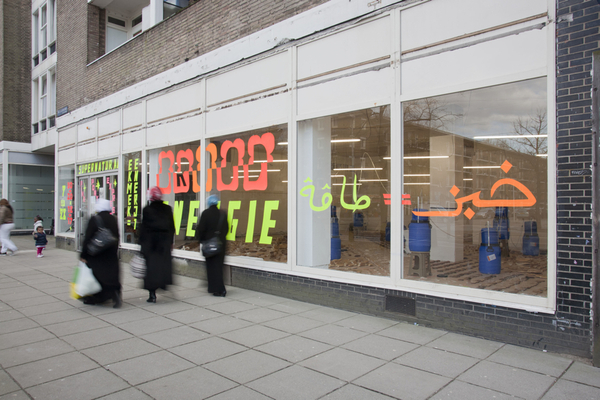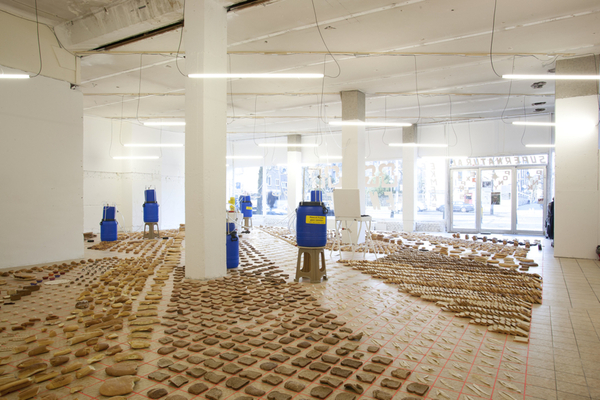One of the exhibitions that caught my interest a little while back was a show called Supernatural, put together by the artist collective Pink Pony Express. In February this year they transformed an empty building in the Kolenkitbuurt in Amsterdam West (dubbed the city’s worst neighbourhood in 2009) into a pop-up exhibition space. On the floor of the space they made a mosaic installation using old bread from the local Muslim community. Bread, according to the Koran, is holy and should not end up with the other rubbish in the bin. In line with this, the local Muslims had left it out on the streets. Because this inevitably attracted rodents, the council provided containers so the bread could be recycled. But this recycling never happened. Instead, and to the anger of many who found out, the council drove it straight to the landfill. Pink Pony Express reacted to this and engineered a system where digesters are used to transform the energy in the old bread into gas, which can be used to heat buildings (or bake new bread). L'art pour society’s sake par excellence.
Curious to see what happened with the project, I met Tara Karpinski, one of the artists in the collective, for tea.

Georgia Haagsma: It was great to see how the opening night of Supernatural attracted a wide variety of people: artists, police officers, parents with children, Imams…
Tara Karpinski: Yes, this is why it is very important for us to build installations on location. It is pivotal to our practice that we don’t make ‘art for artists’ - and that the people in the neighbourhood become the curator as well as the spectator. It was their [the community’s] bread that was exhibited on the floor and it was important they were given a chance to participate and react. We always try to evoke interaction.
How did the project continue after the exhibition finished?
The eventual, long-term goal is to replace the bread containers in the neighbourhood with a digester. In the next couple of months, we’ll be doing a pilot project, where we teach the people from the nearby mosque how they can manage the digesting process themselves. We aim to put a large digester next to the mosque to eventually provide heat for the mosque and, hopefully, the community gym next-door. Once the pilot has ended the project will be taken over by a coalition who will implement it further, and we hope it will be realised by the end of next year.
How do you classify your projects and the collective?
We’re a bit allergic to the term ‘social design’, because this implies that you want to make a change. We are artists, not social workers, and we work within the societal context – this context, so to say, is our paint. That may sound a bit corny, but you get the gist. We don’t aim to change the world. We’re more like journalists, who look at a situation and try to give it a visual shape. Sometimes things do happen of course as a result of our actions, but this mainly seems to happen once we’ve already gone. We start the discussion, and the discussion goes on.
During the exhibition, the bread was lying on the floor, which is sacrilege according to the Koran. Did you get many negative responses to this?
Yes. But this was a choice. The space at the Bos en Lommerweg, where the project was shown, is very visible [it's red with big glass windows]. We noticed people looking in from the street but they didn’t dare to come in. When we put the bread on the floor, they weren’t just curious, but also angry. This almost forced them to come in, because they wanted to tell us they were upset. We then explained what we were doing and in almost all cases turned their anger around.

Why the name, Pink Pony Express?
It just lingered. It is based on the Pony Express, which was a service in America predating the national mail service. Basically, it was a man on a horse who delivered mail from the East to the West coast. The name comes from this, meaning you can achieve a lot with simple means.
Pink Pony Express is currently in St Petersburg analyzing data from weather satellites to predict rainbows over Russia, and will be back in Amsterdam in July to continue with the digester.
(All images: Courtesy Pink Pony Express; Photo by Marc Faasse.)















